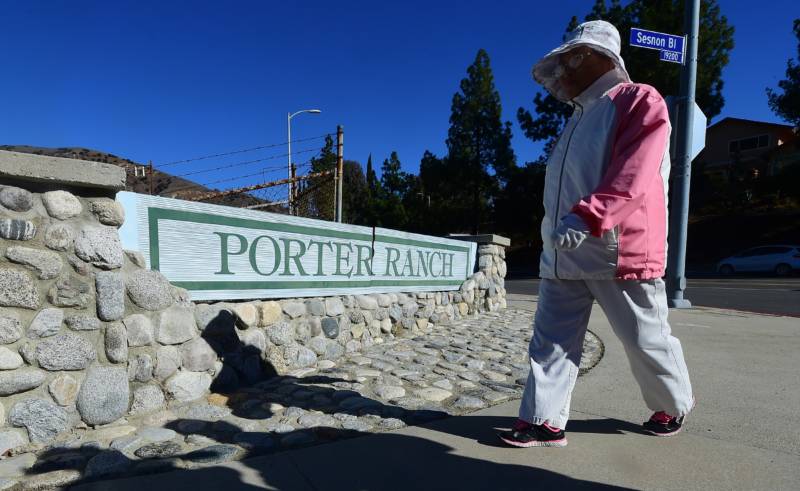“They get to count methane reduction that was already happening on the public dime,” said attorney Nina Robertson of Earthjustice.
More than a fifth of the settlement will go to funding mitigation of the 109,000 metric tons of methane released after the well blowout.
The incident sent a sulfurous stench over the community of Porter Ranch, where residents complained of headaches, nausea, nose bleeds and other symptoms.
The company has spent more than $1 billion related to the blowout with the majority of that going to temporarily relocate 8,000 families, according to filings with the U.S. Securities and Exchange Commission. The utility still faces more than 385 lawsuits on behalf of 48,000 people.
Under the settlement, the utility agreed to pay up to $25 million to study long-term health consequences; reimburse city, county and state governments for responding to the incident; and monitor chemicals in the air near the facility for eight years. Costs of the settlement can’t be passed along to ratepayers.
The mitigation part of the deal calls for the utility to pay $26.5 million toward technology that captures methane from lagoons of cow manure and pipes it into the natural gas supply chain to be used to fuel trucks that run on compressed natural gas.
A coalition of environmental groups criticized that decision as an inefficient way to absorb the methane and said it would lead to larger and more concentrated dairies and lead to smoggier air in the already heavily polluted San Joaquin Valley while also creating more natural gas infrastructure at a time when cleaner alternatives are needed.
Hundreds of residents in the Porter Ranch area also signed a petition opposing the settlement. Several at the hearing complained about being deceived by public officials in allowing settlement funds diverted from the area where they identified other places where methane could be reduced.
“We were promised that money to be given to L.A. County for use in mitigation projects down here,” said resident Patty Glueck. “That’s what should have happened — not given to capturing cow farts from these dairy farms. It’s ridiculous. We were lied to.”
The California Air Resources Board said the settlement targeted dairies, which contribute 25 percent of the state’s methane, and by capturing greenhouse gases on farm, it would provide energy to fuel trucks that will eliminate pollution otherwise created by diesel big-rigs.
“This agreement will mitigate the methane leak itself, and will have a positive impact across California while providing long-term funding for air quality improvements in the parts of the LA basin most directly affected by what happened at Aliso Canyon,” said CARB Chair Mary Nichols.
Earthjustice criticized the deal because SoCalGas will receive full credit even though public funds are being used. It also said there’s not enough information to determine what percentage of a project the gas company will fund.
If SoCalGas contributes 10 percent of the funding to a dairy where 5,000 tons of methane is captured, it should only get credit for mitigating 500 tons — not the full amount, Robertson said.
“Without such an adjustment, the mitigation agreement grossly overstates SoCalGas’ contribution in achieving methane reductions and fails to constitute full mitigation for the Aliso disaster,” Robertson wrote.

